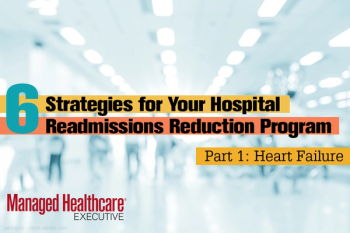
The ultimate guidebook on everything you need to know about reducing hospital readmissions-the most common risk factors, the reimbursement issues, and how real-world hospitals are solving the problem.

The ultimate guidebook on everything you need to know about reducing hospital readmissions-the most common risk factors, the reimbursement issues, and how real-world hospitals are solving the problem.

The policies and approaches healthcare leaders should promote.

New research has shown the system has concrete benefits for both patients and providers.

Why new payment models require new staffing considerations.

Here’s what healthcare organizations will face in the year ahead, and expert advice on how to deal.

A new report explores how healthcare executives can equip their healthcare organizations to make informed decisions about what type of reimbursement risk to take on.

Biosimilar agents can help healthcare organizations offer patients more options for their care. So, what’s stopping payers from immediately adding them to their formularies?

Four things you need to know about the Trump Administration’s proposed regs.

UPMC Health Plan has recently entered into two value-based contracts for medications related to treating diabetes and opioid addiction.

A Quest Diagnostics survey has surprising results about perceptions of physicians and health plan executives on progress toward value-based healthcare.

This month’s featured exec is Deborah Feldman, president and CEO of Dayton Children’s Hospital. Here, she sheds light on how the future of healthcare is shaping up, and how value-based care, the ACA, and pediatric pain management fit in.

An RFI presents an important opportunity for the healthcare industry to educate CMS on current experiences and challenges.

A new study has shocking results about market-level rather than model-level impacts of value-based payment.

If you’re not asking the right questions, your healthcare organization could be missing out. Here are five questions every healthcare organization should be asking.



Trepidation by providers to take on more risk is threatening the road to value-based care.

The new Bipartisan Budget Act of 2018 (to be in effect on January 2019) institute new reimbursement guidelines for biosimilars under the Medicare coverage gap discount program that remove disincentives for biosimilar uptake and level the playing field for the future market place.


The new Bipartisan Budget Act of 2018, to be in effect on January 2019, institutes new reimbursement guidelines for biosimilars under the Medicare coverage gap discount program that remove disincentives for biosimilar uptake and level the playing field for the future market place.

Ron Barkley, president of the Cancer Center Business Development Group, which consults with oncology providers on value-based care arrangements, shares tips.

By using a patient-centered, physician-led model of care, Blue Cross Blue Shield (BCBS) of Michigan lowers recidivism and healthcare costs.

Across the country more states are taking steps to limit patients’ exposure to surprise out-of-network bills.

A West survey has revealing findings about patient satisfaction.

In lines of care where improved outcomes aren’t paired with bonus payments, motivating providers and members to close gaps in care can be difficult.